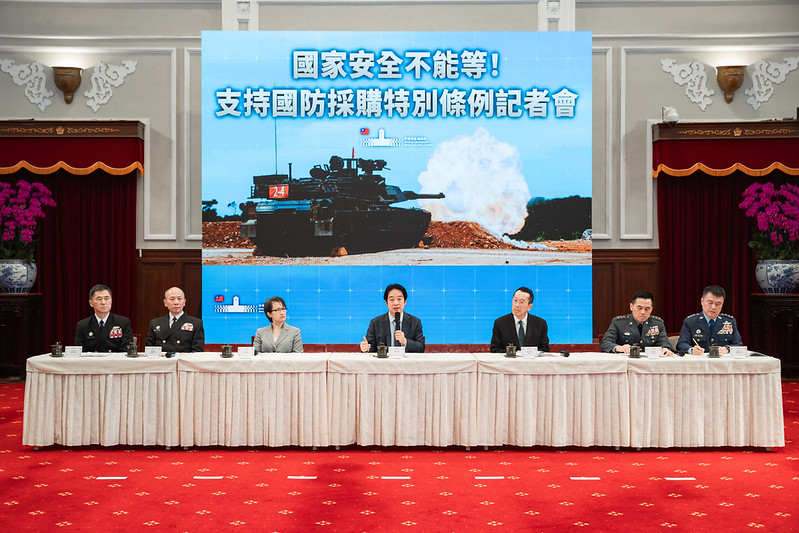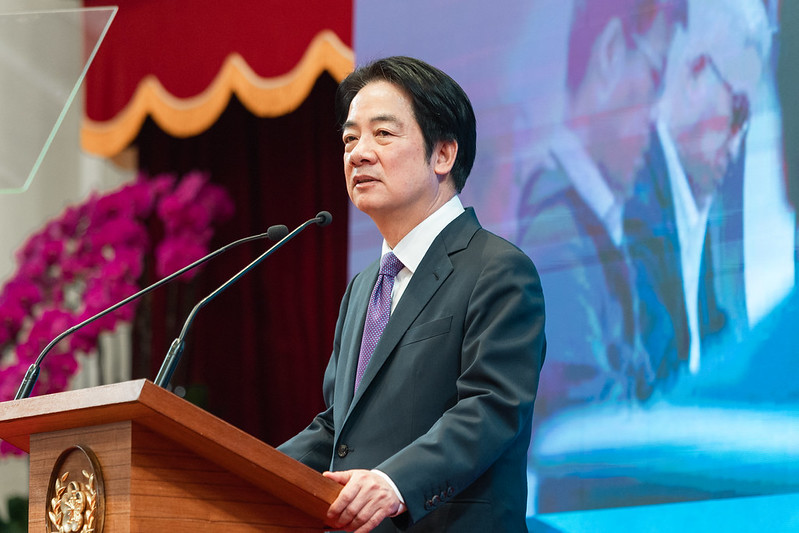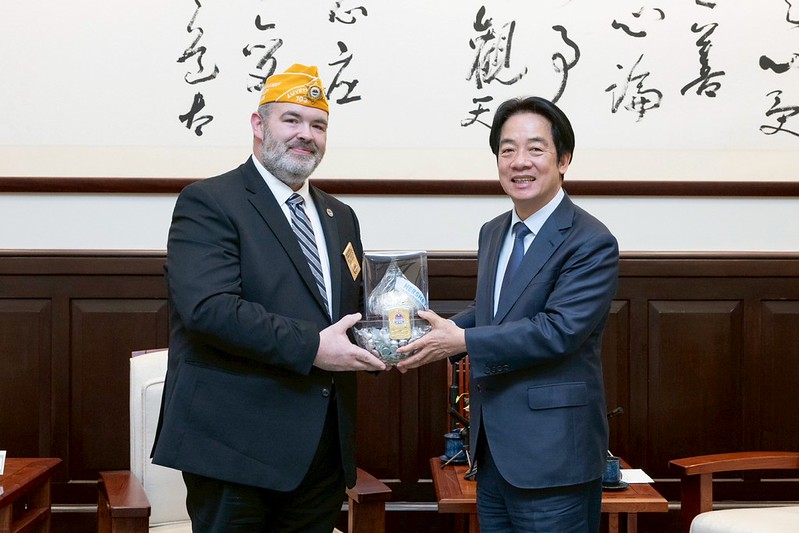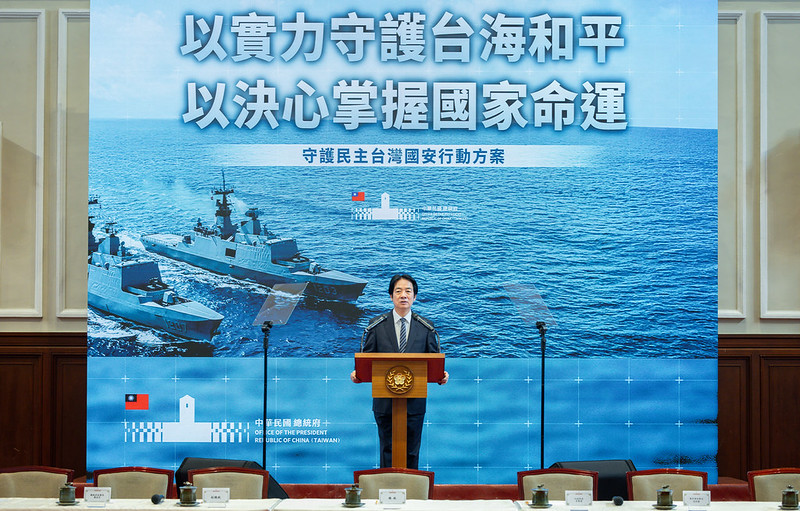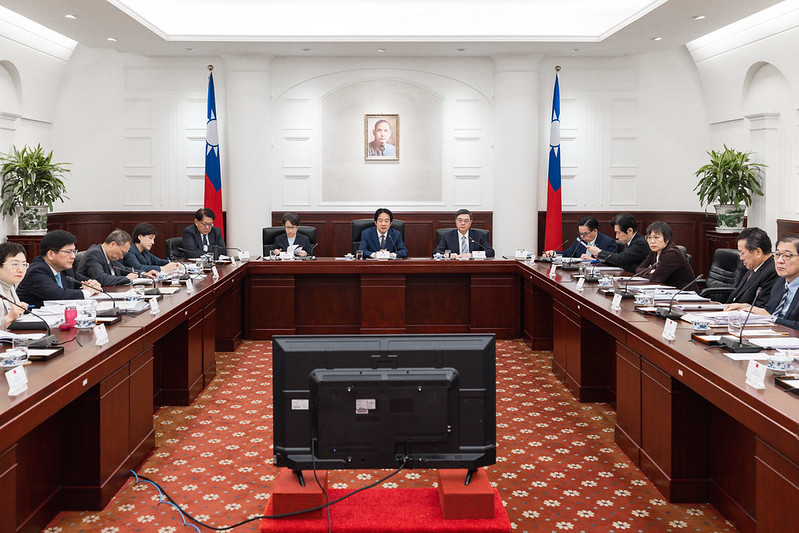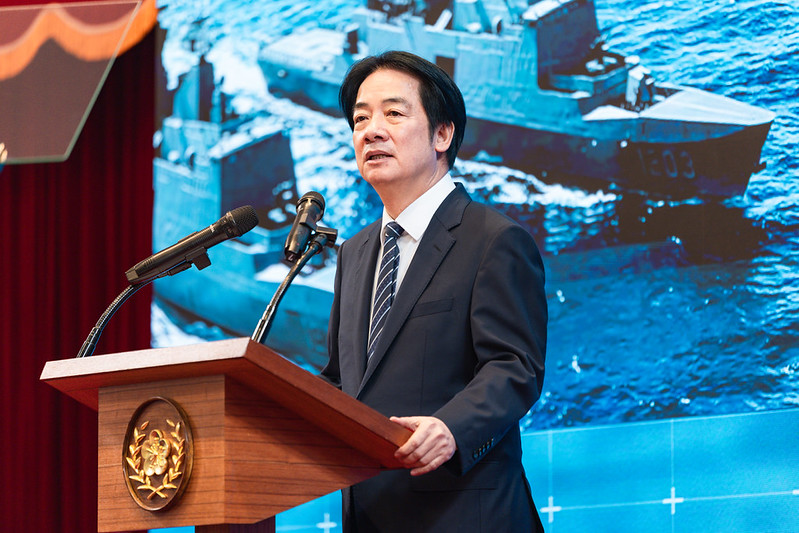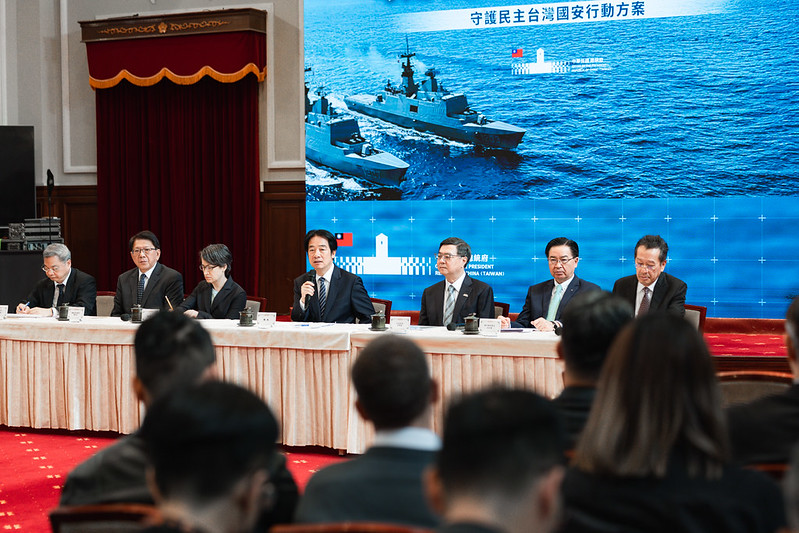News & activities
 News releases
News releases
On the morning of November 26, President Lai Ching-te convened a high-level national security meeting regarding action plans to safeguard democratic Taiwan. Following the meeting, the president held a press conference to address intensifying threats from China against Taiwan and the Indo-Pacific region, introducing two major action plans: to uphold national sovereignty with a comprehensive democratic defense, and to bolster defense capabilities while developing a robust, full-spectrum defense industry.
President Lai stated that the national security team and executive agencies will take action to demonstrate to the world Taiwan’s firm resolve and will to safeguard the nation and maintain the status quo. He said that the government aims to build defense capabilities, economic strength, and democratic defense mechanisms sufficient for Taiwan to protect itself, comprehensively responding to urgent national security threats and sparing no effort to safeguard democratic Taiwan.
The president emphasized that democracy is not a provocation, and Taiwan’s existence is no excuse for aggressors to disrupt the status quo. Safeguarding democratic Taiwan, he said, is the shared responsibility of the government, ruling and opposition parties, and all the people of Taiwan. He expressed hope that all citizens will unite to safeguard the nation and the freedom of Taiwan’s people.
A translation of President Lai’s remarks follows:
Earlier today, I convened a high-level national security meeting to hear a briefing from our team regarding the current national security situation.
The Beijing authorities have recently been comprehensively advancing attempts to turn democratic Taiwan into “Taiwan, China.” This has already posed a severe threat to our national security and Taiwan’s freedom and democracy. After thorough discussion, we have formulated a concrete strategic response: two national security action plans to safeguard democratic Taiwan, which I will now present.
As the international community has noted, China’s threats against Taiwan and the Indo-Pacific region are intensifying. Recently, hybrid threats, including various types of military provocations, maritime gray-zone tactics, and disinformation and cognitive operations, have occurred continuously in and around Japan, the Philippines, and the Taiwan Strait, causing deep unease and disturbance for all parties in the region, including Taiwan.
Furthermore, the Beijing authorities have set the goal of completing military preparations to attempt unification with Taiwan by force by 2027, and are accelerating preparations for an attempted invasion. They continue to ramp up military exercises and gray-zone aggression around Taiwan with the ambition to annex Taiwan by militarily forcing unification or surrender.
Aside from its use of military force, China is also escalating legal, psychological, and public opinion warfare in its effort to erase Taiwan’s sovereignty from the world stage. By opposing independence, urging for unification, and engaging in transnational repression, it is attempting to encroach upon the jurisdiction of the Republic of China government and create a false impression of their substantive “governance” over Taiwan.
China is expanding its united front infiltration and division tactics within Taiwan, with the aim of obscuring the national identity of our citizens and weakening our unity, all to forcibly impose their goals of “one country, two systems” and “governance by ‘patriots’” in Taiwan.
The purpose of these actions is to take a free and prosperous Taiwan, a Taiwan that shines on the world stage, a democratic Taiwan, and lock it in an authoritarian cage under the label “Taiwan, China.” This would allow them to achieve their ambition of annexing Taiwan and dominating the Indo-Pacific region.
To address this situation, which is more severe than ever, our national security team has formulated two major action plans to fully address urgent national security threats and safeguard democratic Taiwan.
The first of these is to uphold national sovereignty with a comprehensive democratic defense.
I want to reiterate that democratic Taiwan is a sovereign, independent nation; that among people here and in the international community, some call this land the Republic of China, some call it Taiwan, and some, the Republic of China Taiwan; that the Republic of China and the People’s Republic of China are not subordinate to each other; that Taiwan resists annexation or encroachment upon its sovereignty; and that the future of the Republic of China Taiwan must be decided by the 23 million people of Taiwan. This is the status quo that we must uphold.
Therefore, we firmly oppose China’s distortion of United Nations General Assembly Resolution 2758 and its manipulation of historical World War II documents to falsify historical facts and falsely claim that Taiwan is part of the People’s Republic of China. We remain highly vigilant to the reality that while accelerating preparations to attempt unification with Taiwan by military force, China is also intensifying its push – internationally, across the strait, and in various fields – for an ostensibly “peaceful” unification that is in reality a forced unification, with the goal of bringing Taiwan under the jurisdiction of China.
When it comes to national security, there is no room for compromise. National sovereignty and the core values of freedom and democracy are the foundation of Taiwan’s establishment. This struggle is not about ideology, and even less is it about unification versus independence. Rather, it is about defending democratic Taiwan and refusing to submit and become “Taiwan, China.” This is the shared position of the Taiwanese people.
To uphold our sovereignty and build a strong democratic defense, we will take the following concrete actions:
First, our national security team will work with the relevant agencies to establish a permanent task force to formulate action plans centered around democratic Taiwan versus “Taiwan, China.” Through strategic international and domestic communication, historical narrative, and counter-lawfare, these plans will help link Taiwan society and friends and allies to show the world that democratic Taiwan has the determination and will to defend itself and resolutely maintain the status quo. They will also comprehensively counter Beijing’s hegemonic actions that attempt to eliminate the sovereignty of the Republic of China and take away the freedom of Taiwan’s people, all of which disrupt the status quo.
Second, facts and truth are the foundation upon which democratic countries build social trust and strengthen national identity. The Executive Yuan will assess China’s intervention, interference, and possible impact during major acts of governance and elections. By revealing the facts and ensuring the circulation of correct information, we will enhance the understanding and awareness of all sectors of society regarding Beijing’s interference in our internal affairs and its promotion of forced unification, strengthen our national identity, and achieve internal unity in facing external forces.
Third, the 17 major strategies to counter China’s united front infiltration and national security threats that were released and implemented in March this year have already yielded initial results. The government will continue to implement those strategies and accelerate the promotion of legislation for 10 national security laws and related administrative measures to strengthen our protection of national security.
Fourth, the Executive Yuan, along with the National Security Council (NSC), will take concrete measures and effective countermeasures against China’s transnational repression of Taiwan’s people, including: establishing a reporting, liaison, and protection system for victims; strengthening strategic communication with friendly and allied countries and international organizations to enhance transnational cooperation to protect potential victims; and improving the legal system and severely punishing local collaborators who assist China in carrying out transnational suppression, harming our nation and its citizens.
Fifth, opinion polls show that the people of Taiwan have always overwhelmingly opposed China’s “one country, two systems” model for Taiwan. Through government policy declarations, Legislative Yuan resolutions, and collective action by political parties and civil society groups, it should be established that for Taiwan society, the “one country, two systems” model crosses a red line. On that basis, institutional norms should be established for exchanges and political dialogue between domestic political parties, legal entities, or civil society organizations and China, while using the principles of democratic governance and transparency to prevent China from exploiting Taiwan’s internal conflicts to promote forced unification.
Next is an explanation of the second action plan: bolstering defense capabilities while developing a robust, full-spectrum defense industry. Peace is won through strength, and investing in national defense is investing in security, and investing in peace. Faced with China’s ever-increasing military threats and hegemonic ambitions toward the region and Taiwan, democratic countries in the Indo-Pacific region such as Japan, Korea, the Philippines, and even Australia are gradually forming a consensus on island chain defense and responsibility sharing, making more national defense investments, and strengthening their response to China’s threats.
As the most important and critical link in the first island chain of defense, Taiwan must not become a gap in regional security. Taiwan must show determination, and take on greater responsibility for self-defense by enhancing national defense more quickly, dealing with threats through indigenous defense and joint deterrence. Three major strategies – denial, resilience, and the adoption of smart technologies – will be used to achieve the following three phased goals:
The first goal is to achieve a high level of combat readiness for our armed forces’ joint combat units by 2027 to effectively deter threats from China. The second goal is to further build highly resilient and comprehensive deterrent defense capabilities by 2033. Our ultimate goal is to build national defense capabilities that can defend democratic Taiwan indefinitely.
For this, we will take the following concrete actions:
First, in response to development trends in global defense, Taiwan will systematically increase defense spending. Defense spending, as it is defined by NATO, will exceed 3 percent of GDP next year, and will reach 5 percent of GDP by 2030, demonstrating our determination to defend the nation.
Second, to build key combat capabilities for future warfare scenarios, the Ministry of National Defense (MND) has completed the planning and budgeting for a special act on procurement for enhancing defense, resilience, and asymmetric capabilities. Over the next eight years (2026-2033), we plan to invest NT$1.25 trillion to develop an advanced defense system including three major features: the T-Dome, a multi-layered air defense system with high-level detection and effective interception; the introduction of advanced technologies and AI to form a resilient defense system that enables efficient decision-making and precision strikes; and enhanced indigenous defense capabilities, expanding the defense industry for economic and security benefits.
Third, the Executive Yuan will complete their review of the draft act and submit it to the Legislative Yuan. It will also instruct the Ministry of Finance and the Directorate-General of Budget, Accounting and Statistics to properly manage funding sources and finances to avoid crowding out other budget items.
Fourth, in view of the successful integration and rapid iteration of new technologies, the MND will comprehensively optimize and strengthen equipment procurement mechanisms, accelerate acquisition and military development timelines, and ensure anti-corruption measures are in place to prevent delays.
Fifth, while introducing advanced equipment and continuously developing asymmetric capabilities and defense resilience, the MND will to its utmost to implement comprehensive and timely reforms to optimize military force structure and develop new training methods, tactics, and logistical support.
Increasing defense spending not only enhances military capabilities and national security, but also strengthens defense industry development and boosts national income. In addition to foreign procurement, this special budget will allocate a significant portion to domestic construction projects, commercial purchasing, and commissioned production, creating substantial economic output and employment opportunities.
With Taiwan’s strong capabilities in high tech and manufacturing, including an integrated ecosystem of semiconductors, ICT, and AI, as well as precision machinery and related foundational industries, the country can play a significant role in the global advanced defense and military industry. This can also drive the transformation and upgrading of domestic industries and the economy, enabling more engineers and technology professionals to help strengthen national defense, fulfilling our goal of building a strong nation with prosperous citizens.
Sixth, the government will promptly formulate an action plan for defense and military industry development. On this basis, we will develop a comprehensive strategy to further advance Taiwan’s industry and economy.
Seventh, to support cooperation with friends and allies and build non-red supply chains, we will strengthen measures on the protection of high tech to fully safeguard and utilize advanced technologies.
Eighth, the NSC, together with the MND and relevant agencies, will strengthen public communication, build consensus, and secure the support and recognition of our people, guided by the principle of investing in defense, peace, and Taiwan’s economic future.
My fellow citizens, China has many scenarios for annexing Taiwan, but the greatest threat of all is not their military force, but our giving in. Under China’s united front offensive, some individuals regard upholding democracy and enjoying freedom as a provocation to China, mistakenly believing that if the people of Taiwan are willing to give up some freedoms or sacrifice some sovereignty, and humbly accept the transformation of democratic Taiwan into “Taiwan, China,” it could somehow secure “peace.”
History, however, has shown that compromising with aggressors only leads to endless war and oppression. In 1938, many in Europe believed that if Czechoslovakia ceded some territory to the fascists, it could secure a generation of peace. Instead, it triggered the full outbreak of World War II, bringing untold suffering and tragedy. In 1951, the people of Tibet thought that by signing the Seventeen Point Agreement with Beijing, they could preserve their culture and way of life. Instead, their snowy nation became a red plateau under communist control.
Democracy is not a provocation, and Taiwan’s existence is no excuse for aggressors to disrupt the status quo.
As a democratic country, our ruling and opposition parties may hold differing views, but we sincerely hope that in safeguarding democracy and freedom of the Republic of China Taiwan and ensuring national sovereignty, we can oppose any actions that disrupt the status quo of peace and stability in the region. Protecting democratic Taiwan and preventing Taiwan from being forcibly annexed or reduced to “Taiwan, China” must be the shared responsibility of the government, ruling and opposition parties, and all the people of Taiwan. We must all unite to safeguard our nation and the freedom of Taiwan’s people.
Our national security team and administrative agencies will now take action to build defense capabilities, economic strength, and democratic defense mechanisms sufficient for Taiwan to protect itself – laying an unshakable foundation to secure Taiwan’s safety and national sovereignty.
For Taiwan, for the Republic of China, let us all take action together! Thank you.
May Taiwan be blessed! Let’s keep going, Taiwan!

